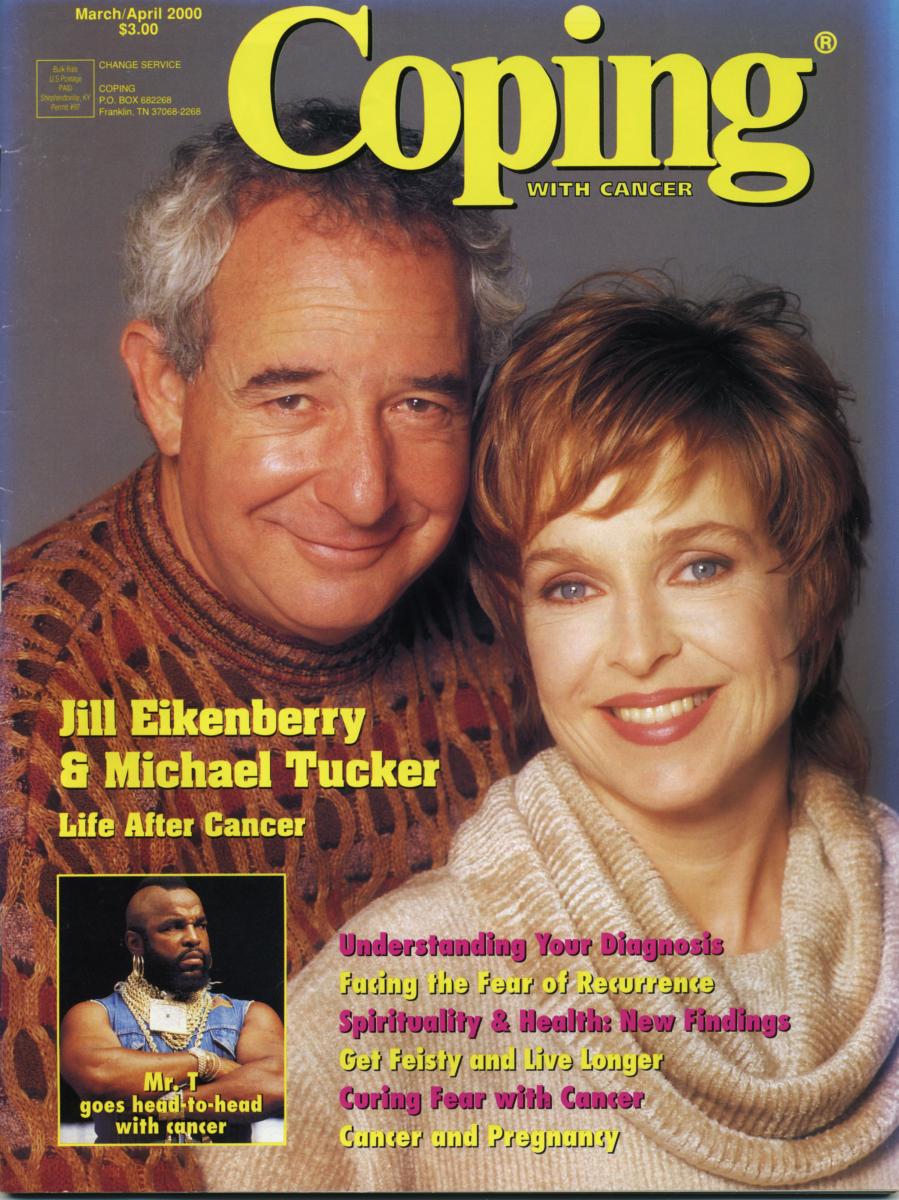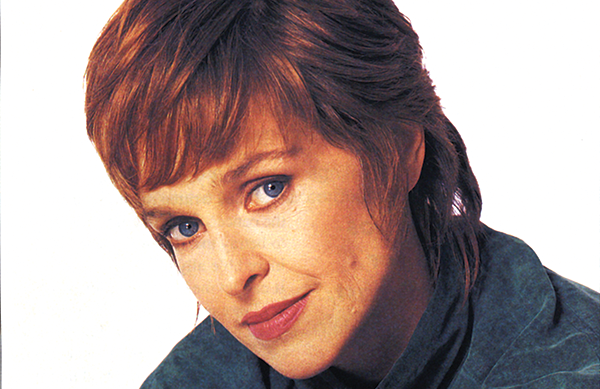Jill Eikenberry
Reflections on 13 years of life after surviving breast cancer.
as told to Cindy Phiffer for the readers of Coping magazine.
Every actress knows that timing is everything when creating a great dramatic moment. But the timing of Jill Eikenberry’s breast cancer diagnosis 13 years ago [as of 2000] proves that real life can be much more dramatic than any movie or TV show.
Jill, and actor husband, Michael Tucker, had just shot the pilot of L.A. Law in Los Angeles. “It was a dream of a job for Michael and me – great script, great cast, and we were working together – that just never happens!” exclaims Eikenberry.
After 18 years of marriage and surviving the struggles of a New York theater career, the couple felt that their time had finally come. They came back to New York to pack up and move their kids and their lives out to L.A. They were flying high.
“And that’s when I found a lump in my breast. I had never checked myself before. I don’t know what made me do it – but I knew immediately that something was very wrong.”
“After the doctor told us that it was cancer, I remember walking down the hallway of our apartment – we had one of those dark New York apartments – and I remember thinking that there’s no light at the end of this tunnel. I’m going to die.”
At one point during the fearful weeks that followed, Michael called Steven Bochco, the couple’s good friend and the creator of L.A. Law and told him the news. “We can’t do the show, Stevie. Jill has cancer.” But Bochco had a different story line in mind. He arranged for Jill to have her radiation treatments at UCLA every afternoon after shooting and he promised that no one would have to know.
“Mike and I were both pretty numb by the time we arrived in L.A. for the second time. But it was much more fun to focus on becoming TV stars than it was focusing on cancer. And I think playing Anne Kelsey really helped me. She was so sure and so angry –– it was hard to feel like a victim during the day. Of course, when I got home at night that changed. I remember thinking, ‘Are there earthquakes every night in L.A.?’ But I think I was the one who was shaking.”
Jill, and actor husband, Michael Tucker, had just shot the pilot of L.A. Law in Los Angeles. “It was a dream of a job for Michael and me – great script, great cast, and we were working together – that just never happens!” exclaims Eikenberry.
Michael and Jill made the decision to keep the cancer a secret from all but their very closest friends. No one in the cast knew. But holding it all in took a toll on both of them.
It wasn’t until two years later that they really began to talk about it. “Linda Otto, a TV director/producer approached me about doing Destined to Live,” Jill remembers. The documentary would be a chance for Eikenberry to go public with her cancer and interview breast cancer survivors and their spouses about the emotional aspects of the disease. The production served as a catalyst for Jill and Michael, providing them with an unusual venue for disclosure.
Television was familiar territory for Eikenberry and Tucker. Hearing other survivors speak the unspeakable set the stage. The camera acted as a safe listener and trusted translator, drawing each of them out of their denial. Emotional scars left from the cancer began to heal. Jill was finally able to talk about the loneliness and despair she had felt since her diagnosis. Michael allowed himself to face his own limitations – his anger about the prospect of being abandoned and his fear at watching his lover and friend being attacked by cancer.
Jill remembers, “I had been so worried about going public – about saying ‘I’ve had cancer.’ I thought people would look at me with pity. Instead, when I announced in front of a roomful of reporters that Destined to Live would be on the NBC primetime schedule for the upcoming season, I felt the door open to a wonderful world of support. Anne Kelsey had given people the impression that I was unapproachable. Suddenly, everyone was coming up to me with their stories.”
“Mike and I speak all over the country,” says Jill. “We sit on comfortable chairs and chat about our story. It’s very personal. That usually opens the door for a lot of interaction with the audience. That’s our favorite part. We have so many open-hearted conversations with people. I have been amazed to find myself in parts of the country that I’ve never related to and find all kinds of people who are very like us in terms of their stories, but also people that are incredibly inspiring to me because of the particular path they’re taking.”
The Tuckers are also excited about communicating with people on the Internet. They’re hosting a new Website called GenerationA.com, where they’ll be able to “talk” about health and relationship issues with other people who are 50 and over.
“I get a lot from speaking to people who have recently been diagnosed. I used to be afraid that it would take me down, put me back there and make me sad, or that the little tip of despair would surface again. But in fact, being able to talk openly about mortality inspires me to fully explore the possibilities of each day. I don’t know if my life would be as rich today if I hadn’t had my experience with cancer. Maybe I’d have found these sort of truths for myself, but unfortunately, I think sometimes we have to get hit over the head with a two-by-four to realize that we need to reprioritize.”
Part of Jill’s adjusted outlook includes a commitment to honest communication, making her marriage a top priority , and learning to listen to the greatest expert on her own body – herself.
“I had written my body off after the cancer. I felt like it was going to betray me. I now know what an incredible ally my body can be. It can let me know what the truth is.
“I’ve learned to hear a more authentic voice inside that lets me know who I am,” says Jill. “It had been drowned out by voices of fear for a long time – ‘Don’t let anybody down,’ ‘Be sure you fill ip all you time,’ ‘Don’t leave any cracks open because the void is going to show you something you don’t want to see.'”
“I had written my body off after the cancer. I felt like it was going to betray me. I now know what an incredible ally my body can be. It can let me know what the truth is. For example, when I’m feeling tired, it frequently isn’t about loss of sleep, but about working overtime to suppress an emotion. I find that if I get off to myself for a few minutes and let the emotion come up and out, I suddenly have lots of energy.”
In Jill’s ongoing quest to stay tuned into her body and live a healthier life, she discovered Revival, a doctor-formulated soy protein supplement for which she recently became the official spokesperson. The youthful 53-year-old also meditates every day and encourages other cancer survivors to do the same, saying, “Silence is so important. It’s the only way I can hear that authentic voice – the one that reminds me how good it all is.”
Although it’s been 13 years, cancer continues to affect the way Jill Eikenberry looks at life. “The realization that I’m going to die of something, maybe not cancer, became much more apparent to me after my cancer diagnosis. The question that comes with that realization is, ‘How do you want to live?’ Answering that can take a lifetime.”

You can keep up with Jill Eikenberry by following her on Instagram (@JillEikenberry).
This article was published in Coping® with Cancer magazine, March/April 2000.


